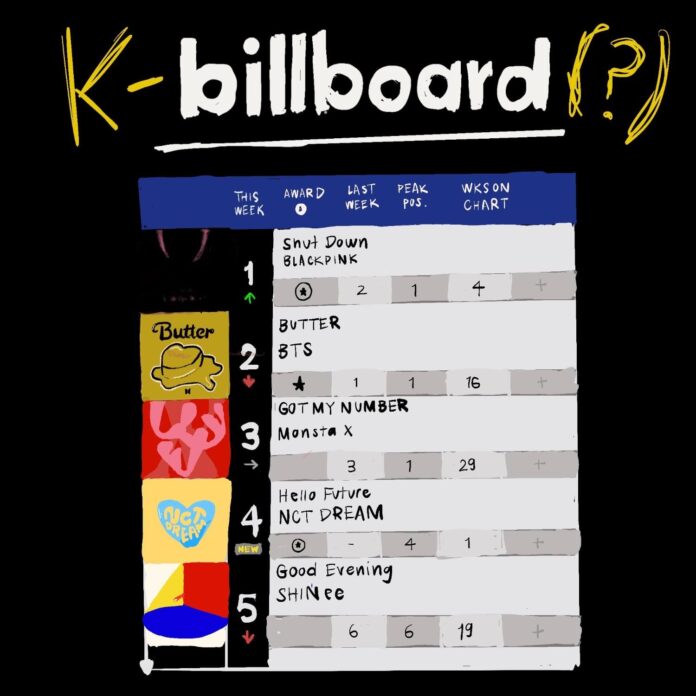One step forward, one step back.
On Oct. 24, Billboard announced a new segment of their music award show: The-K Billboard Awards. The event reportedly has the intention of “highlighting the dazzling achievements of K-POP artists based on the Billboard charts.” What seems like a positive move by Billboard only mirrors a pattern of mistreatment and xenophobia by the U.S. media towards Korean artists.
Blatantly, The-K Billboard Awards is another move to segregate Korean artists from the rest of the (mainly English-speaking) competition. This is not “highlighting” or giving a positive spotlight to Korean artists, but rather, excluding them into their own detached category — a category essentially determined by ethnicity. We’ve seen this in the past, when in 2019, the Video Music Awards (VMAs) created a “Best K-POP” category, leaving K-pop groups out of the “Best POP” main category despite the nominees’ success in American music charts.
If these American music award shows are truly meant to showcase and honor the country’s most successful music of the year, then the art deserves to be rewarded — no matter where the artist is from or what language the song is in. Making an entirely separate segment of awards does not “highlight the artists’ dazzling achievements,” but ostracizes Korean artists even further (than they already are!) from other popular artists and music in America.
Korean and American musicians are not cut from the same cloth, but their distinction should not legitimize their exclusion; both the cultural and ethnic implications behind K-pop are integral parts in Korean artists’ identity and the music they create. But because of the evident popularity and success of K-pop in the U.S., K-pop should be accurately evaluated within categories that classify based on genre and not race.
The hypocrisy behind The-K Billboard Awards points out just how useless this event is. If the goal is to highlight dazzling achievements from artists of other countries, Billboard shouldn’t stop at The-K Billboard Awards; shove Adele, Harry Styles and Ed Sheeran into a box and call it The-UK Awards. A show hosted by the U.S. that judges Korean music and performances is pointless, and the accolade would be trivial — South Korea hosts a variety of its own award shows with dignified categories, such as the Mnet Asian Music Awards (MAMA), Asia Artist Awards (AAA) and Golden Disc Awards. In comparison to the established award shows that these Korean artists regularly attend, Billboard’s new segment holds no worth or value.
The-K Billboard Awards was created in collaboration with the K-Culture Festival, which was held in Seoul from Sept. 30 to Oct. 8 and featured many notable K-pop artists such as IVE (아이브), Monsta X (몬스타엑스), NCT Dream (엔시티 드림) and STAYC (스테이씨). Bik Hwang, the executive director of this festival, stated that The-K Billboard Awards are “part of our mission to find the next BTS.”
This statement encourages the misconception that BTS is some sort of heroic, lone embodiment of K-pop, conforming the K-pop narrative in America to a single image.
The septet BTS (방탄소년단) debuted in 2013 and is the first K-pop group to present and perform at the Grammys, as well as be nominated for the esteemed award — all discerned as significant musical achievements in the U.S. In their impressive and ongoing music careers, BTS has found immense success and recognition in both South Korea and across the globe. While they have been commended (rightfully so) for paving the way for K-pop in America, BTS is just one group of a myriad of talent that hails from South Korea. Two successful and accomplished generations of K-pop artists precede BTS, and the group is followed by ever-growing droves of unrivaled talent.
The illusion that BTS is the first and only group to achieve significant success in Western media is an ignorant assumption. K-pop has been integrated into the U.S. far before BTS won Top Social Artist at the Billboard Music Awards (BBMAS) in 2017 (beating out Selena Gomez, Ariana Grande, Shawn Mendes and Justin Bieber), a milestone recognized as a critical moment for the group in America. Concurrent with BTS’ release of their two record-breaking, English hit-singles — “Dynamite” (2020) and “Butter” (2021) — the group Monsta X (몬스타엑스) had released two full-length English albums, with “All About Luv” (2020) debuting at number five on the Billboard 200. 11 years earlier, Wonder Girls (원더걸스) made noise in the U.S. as the first South Korean group to chart on the Billboard Hot 100. And we all know Psy’s prosperous hit “Gangnam Style” (2012). The timeline of K-pop in the U.S. is extensive and noteworthy.
The objective to find the “next BTS” fails to recognize the variety of K-pop and creates a fallacy of the artists that produce K-pop and the music itself. K-pop is as extensive and diversified as any genre gets. Every Korean musician is an artist in their own unique and individual right — not simply a copy or legacy of BTS.
Ultimately, it appears as though the goal of The-K Billboard Awards is to exploit big-name groups such as BTS and profit off of their popularity and eminence (something that the Scammy Awards have done well). But an insult such as this is nothing in comparison to the xenophobia and racism that Korean artists have faced — perpetuated by Western media who refused to acknowledge the legitimacy of foreign, non-English speaking artists. We should not let the U.S.’ attitude towards K-pop — from degrading the artists to diverting them from the competition that they’ve already outsold — distort our perception of the music we are exposed to. Language should not serve as a barrier, but as an opening to an appreciation and understanding of its respective culture. The U.S. music industry needs to put an end to all of the “Best K-pop” categories that music award shows have, and properly and equally recognize Korean artists for breaking into, and succeeding in, the country’s music industry as pop artists.
Contact Emma Cho at echo2@oxy.edu.
![]()































